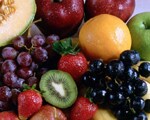Primary school children who do not like eating fruit and vegetables are 13 times more likely to develop functional constipation than children who do.

A number of studies have suggested that functional constipation - which is due to dietary habits, environmental habits and psychosocial factors rather than a particular health problem - is getting worse among school-age children. It is estimated that functional constipation accounts for 95 per cent of cases of constipation affecting children once they pass infancy. The condition has serious consequences, as it can cause a wide range of distressing emotional and physical problems such as stress, soiling, problems at school, damaged self-confidence and reduced social interaction.
To examine what factors were associated with functional constipation amongst primary school students, researchers from Singapore studied the diet and toileting habits of 383 children aged from 8 to 10 years from a school in Hong Kong. Fifty one per cent of the participants were boys and children who were on regular medication or who paid regular hospital or clinic visits were excluded. Seventy per cent of the children who took part in the study were ten- years old, 22 per cent were 9 years old and eight per cent were 8 years old.
It was found that 7 per cent of the children who took part suffered from functional constipation and there were clear dietary differences between the children who did and did not have problems. Girls were more likely to have functional constipation than boys and 9 years olds were more likely to report problems that eight-year olds and ten-year olds.
Also, children who only drank 200 ml to 400 ml of fluid a day were eight times more likely to experience problems than children who drank more. Children who said they did not like fruit or vegetables were 13 times more likely to suffer from functional constipation than children who did.
The researchers suggest that primary schools should work with healthcare professionals to make children more aware of the problem, parents need to be educated about functional constipation so that they can spot problems in their children and make sure that their diet provides sufficient fluid, vegetables and fruit, school tuck-shops should stock high-fibre snacks such as popcorn, fresh food and dried fruit, instead of crisps and sweets, and children should be encouraged to drink plain water during lessons.
DoctorNDTV is the one stop site for all your health needs providing the most credible health information, health news and tips with expert advice on healthy living, diet plans, informative videos etc. You can get the most relevant and accurate info you need about health problems like diabetes, cancer, pregnancy, HIV and AIDS, weight loss and many other lifestyle diseases. We have a panel of over 350 experts who help us develop content by giving their valuable inputs and bringing to us the latest in the world of healthcare.












